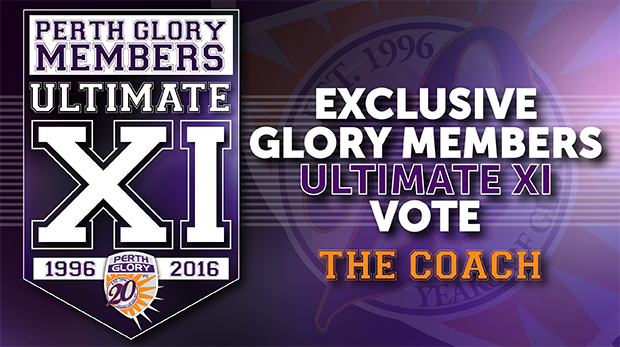As part of our 20th anniversary commemorations we’re calling on members to cast their vote for Glory’s Ultimate XI. Now with the regular season over and as we head into finals, it’s time to cast your vote for Glory’s Ultimate Coach!
ULTIMATE GLORY XI – THE COACHES
KENNY LOWE

Lowe first joined Glory as an assistant to Dave Mitchell back in 2007, while also continuing to run the National Training Centre.
After a brief interlude in 2011, he returned to the club as caretaker Head Coach following Alistair Edwards’ departure in December 2013.
His position was made permanent ahead of the 2014-15 campaign and has guided the club to a top-six finish for the third successive season, having also overseen two FFA Cup Final appearances.
The 55-year-old will chalk up his 100th A-League game in charge, this Sunday against Melbourne City in the second Elimination Final, having already broken Ian Ferguson’s record of 98 A-League games managed in the final round of the regular season.
Before moving into coaching, the man from County Durham enjoyed a 17-year playing career that included stints at Hartlepool, Barnet, Birmingham and Stoke and saw him earn several caps for England’s semi-professional ‘C’ team.
Lowe was still playing for Gateshead at the age of 39 and it was with the north-east club that he began his coaching career, subsequently spending four years in charge of Barrow.
A qualified mechanical engineer and father of five, he has become renowned for his press conference one-liners and animated touchline presence and lists fellow-former-midfielder Glenn Hoddle as his football hero.
BERND STANGE

Undoubtedly the most colourful coach in Glory’s history, Stange spent three tumultuous seasons in charge of the club between 1998 and 2001.
Having coached the likes of Hertha Berlin, Carl Zeiss Jena and the East German national side in the 1980s and early 1990s, the man from Gnaschwitz admitted that he thought Perth Glory was some sort of religious organisation when first approached regarding the position of Head Coach.
But he quickly settled in to life in WA and endeared himself to the club’s fans with his cavalier tactical approach and willingness to engage with the public.
In the German’s first season, Glory reached the preliminary final, while the second culminated in a Grand Final showdown with Wollongong Wolves during which Glory infamously squandered a 3-0 half-time lead before losing on penalties.
Fan demonstrations in support of Stange helped persuade then-owner Nick Tana not to sack him in the wake of that so-called unlosable game, but when Glory suffered an elimination final defeat at the hands of Melbourne Knights the following year, he was replaced by assistant Mich D’Avray.
His subsequent coaching travels took him Oman, Iraq, Cyprus, Belarus and Singapore before he announced his retirement last year at the age of 68.
MICH D’AVRAY

In what was to become a Glory coaching tradition of promoting former assistants to the top job, D’Avray took over the reins from Bernd Stange in 2001 and duly led the club to two NSL titles in the next three seasons.
Tactically more circumspect than his flamboyant predecessor, the South African guided Glory to their second Grand Final appearance in 2002, only for his side edged out by Olympic Sharks.
But it was a case of third time lucky the following year as a 2-0 revenge victory over the Sharks saw the WA club crowned national champions for the first time in their history.
Perhaps even more impressively, D’Avray managed to repeat the feat in 2004 as Nik Mrdja’s ‘golden goal’ clinched a gutsy win over the more fancied Parramatta Power in Parramatta.
He duly moved upstairs to a Director of Football role for the duration of the 2005-06 season, before eventually heading back to South Africa to join Bloemfontein Celtic.
The man from Johannesburg had originally arrived at Glory in 2001 having previously worked with the South Africa Under-23 team as well as club sides Moroka Swallows and Cape Town Spurs.
During his playing career, meanwhile, he was a robust striker who spent 11 years playing in England for Ipswich Town and later had a spell with Dutch side NEC Nijmegen.
Now 55, he joined the technical team at former club Cape Town Spurs last year.
GARY MAROCCHI

Having enjoyed great success with both Perth Italia and the short-lived Perth Kangaroos, Marocchi was a natural fit as Glory’s inaugural Head Coach in 1996.
The former Socceroo’s expansive, free-flowing tactical approach was an instant hit with supporters of the new club, while his engaging, upbeat manner endeared him to the media and to the WA public at large.
A remarkable first season saw Glory draw home crowds of up to 17000 as they ultimately missed out on the finals by a single point, with Marocchi’s contribution earning him a nomination for NSL Coach of the Year.
His second season was unfortunately not quite as successful, with a finals place again eluding the WA side, prompting then-owner Nick Tana to replace him with Bernd Stange.
But the locally-born coach’s influence upon the club’s wider development during those formative years should not be underestimated.
During his playing days, meanwhile, he was a skilful midfielder who won 13 caps for the Socceroos, skippered the WA State team and spent several successful seasons with Adelaide City.
After leaving Glory, Marocchi joined Swan IC and now 61, he remains closely involved in the local football scene as president of NPL WA club, Perth SC.




